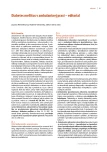-
Medical journals
- Career
Dermatologic manifestations of diabetes
Authors: Mária Breznická; Slavomír Urbanček
Authors‘ workplace: Dermatovenerologická klinika SZU, FNsP F. D. Roosvelta, Banská Bystrica
Published in: Forum Diab 2015; 4(2): 140-147
Category: Main Theme: Review
Overview
Diabetes mellitus is metabolic disorder with large spectrum of skin manifestations, which involves up to 50 % of diabetic patients. Skin complications appear as a consequence of hyperglycaemia, diabetic microangiopathy, macroangiopathy and neuropathy. Skin manifestations may be the first indicator of the disease, marker of decompensation as well as the consequence of the treatment of diabetes. Authors summarize the essential skin changes associated with diabetes.
Key words:
diabetes mellitus – skin manifestations
Sources
1. Romano G, Moretti G, Di Benedetto A et al. Skin lesions in diabetes mellitus: Prevalence and clinical correlation. Diabetes Res Clin Pract 39(2); 1998, 101–106.
2. Vohradníková O, Perušicová J. Kožní projevy při diabetes mellitus. Maxdorf: Praha 1996. ISBN 80–85800–38–1.
3. Mahajan S, Koranne RV, Sharma SK. Cutaneous manifestation of diabetes mellitus. Indian J Dermatol Venerol Leprol 2003; 69(2): 105–108.
4. Diris N, Colomb M, Leymarie F et al. Dermatoses non infectieuses au cours du diabéte sucré: étude prospective de 308 malades. Ann Dermatol Venerol 2003; 130(11): 1009–1014.
5. Fernández-Cuartero B, Rebollar JL, Batlle A et al. Delta aminolevulinate dehydratase (ALA-D) activity in human and experimental diabetes mellitus. Int J Biochem Cell Biol 1999; 31(3–4): 479–488.
6. Humbert P, Nguyen N. Physiopathology of acanthosis nigricans. Ann Dermatol Venereol 1998; 125(11): 851–855.
7. Kelly WF, Nicholas J, Adams J et al. Necrobiosis lipoidica diabeticorum: association with background retinopathy, smoking, and proteinuria. A case controlled study. Diabet Med 1993; 10(8): 725–728.
8. Roggers C. Necrobiosis lipoidica diabeticorum. Dermatol Nurs 2005; 17(4):301–307.
9. Huntely AC. Finger pebbles: a common finding in diabetes mellitus. J Am Acad Dermatol 1986; 14(4): 612–617.
10. Cetkovská P, Pizinger K, Štork J (eds). Kožní změny u interných nemocí. Grada: Praha 2010. ISBN 978–80–247–1004–4.
11. Shemer A, Bergman R, Linn S et al. Diabetic dermophaty and internal complications in diabetes mellitus. Int J Dermatol 1998; 37(2): 113–115.
12. Dinato SL, Costa GL, Dinato MC et al. Scleredema of Buschke associated with diabetes mellitus type 2. Arq Bras Endocrinol Metabol 2010; 54(9): 852–855.
13. Kantor GR, Lookingbill DP. Generalised pruritus and systemic disease. J Am Acad Dermatol 1983; 9(3): 375–382.
14. Rajagopalan S. Serious infections in erderly patients with diabetes mellitus. Clin Infect Dis 2005; 40(7): 990–996.
15. Soysa NS, Samaranayake LP, Ellepola AN. Diabetes mellitus as a contributory factor in oral candidosis. Diabet Med 2006; 23(5):455–459.
16. Raubenheimer PJ, Lewitt NS. Insulin allergy. S Afr Med J 2004; 94(6): 428–429.
17. Kapellen TM, Galler A, Kiess W. Higher frequency of paronychia (nail bed infections) in pediatric and adolescent patients with type 1 diabetes mellitus than in non-diabetic peers. J Pediatr Endocrinol Metab 2003; 16(5): 751–758.
Labels
Diabetology Endocrinology Internal medicine
Article was published inForum Diabetologicum

2015 Issue 2-
All articles in this issue
- Chronical diabetic complications from point of view of modern diabetology
- Personalized medicine in diabetology in the context of consensual statement of the ADA/EASD 2015
- Acute complications of diabetes mellitus from out-patient department perspective
- Importance of self-monitoring of blood glucose
- Compliance and individualized therapeutic targets in patients with DM2T treated with gliptins in monotherapy or in combination with other antidiabetic drugs: CITADELA Study
- The most common gynecologic problems in diabetic women
- Dermatologic manifestations of diabetes
- Forum Diabetologicum
- Journal archive
- Current issue
- Online only
- About the journal
Most read in this issue- Acute complications of diabetes mellitus from out-patient department perspective
- Dermatologic manifestations of diabetes
- The most common gynecologic problems in diabetic women
- Chronical diabetic complications from point of view of modern diabetology
Login#ADS_BOTTOM_SCRIPTS#Forgotten passwordEnter the email address that you registered with. We will send you instructions on how to set a new password.
- Career

